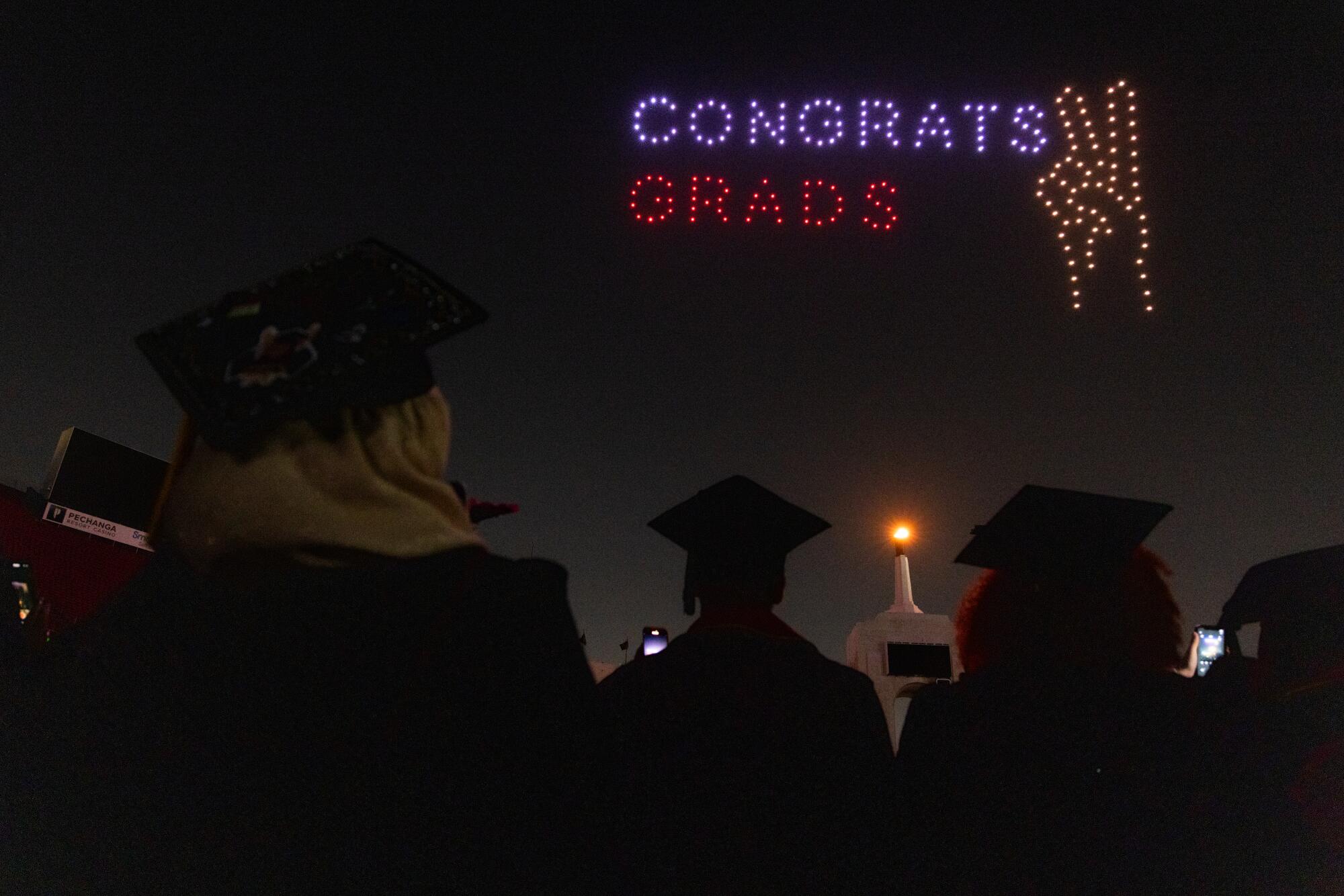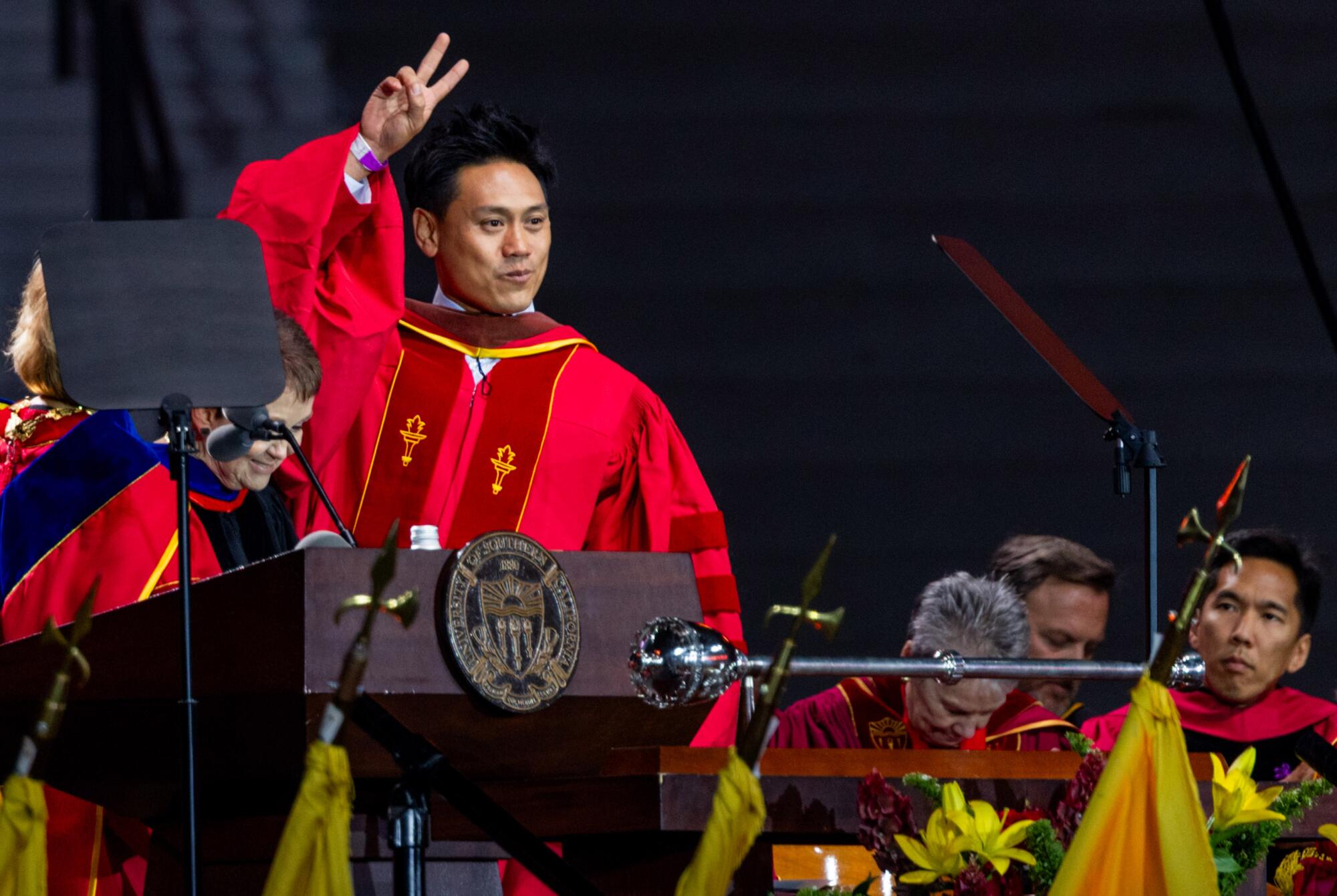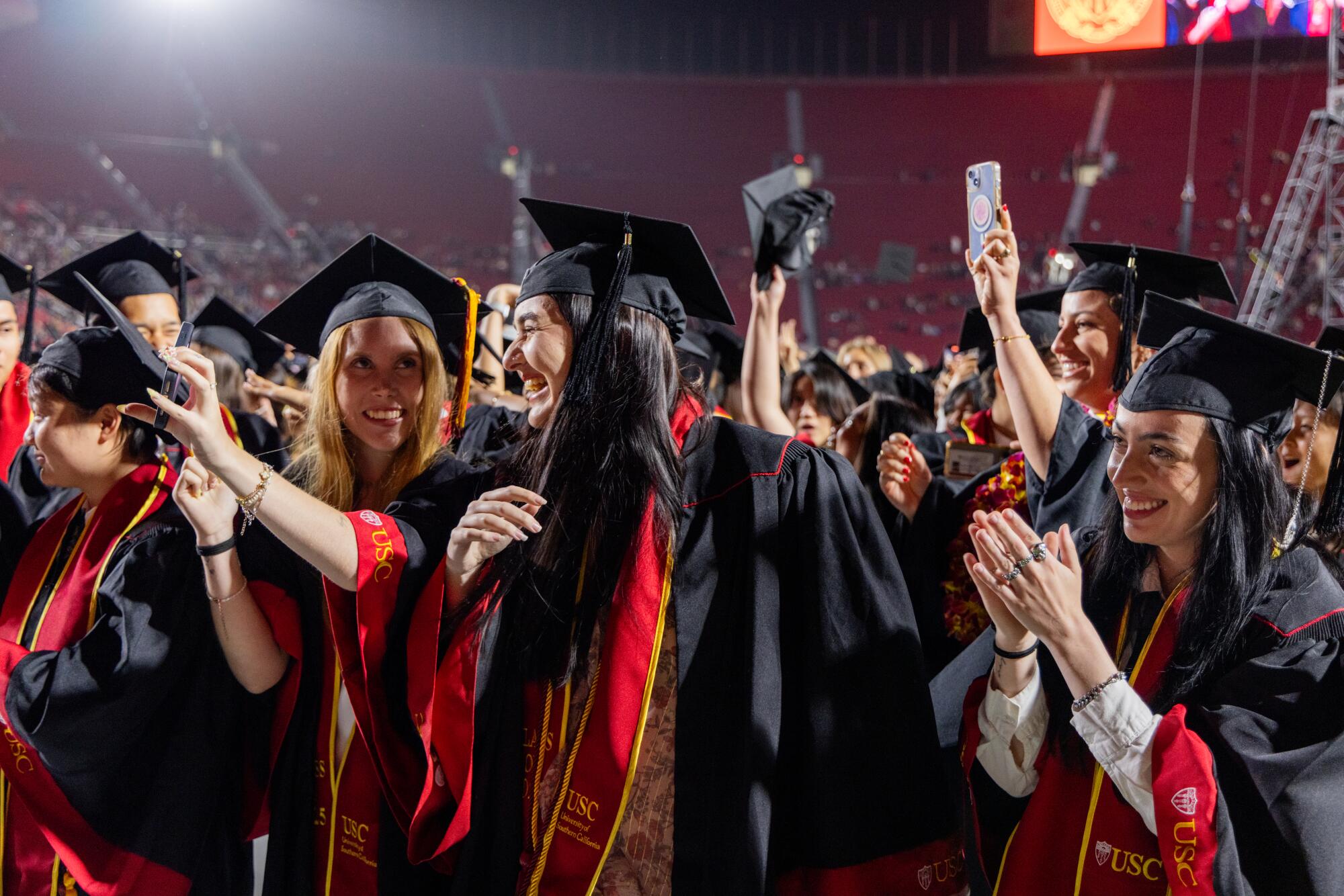As thousands of families poured into the Los Angeles Memorial Coliseum for the University of Southern California’s main-stage commencement on Thursday night, the scene had the feel of the usual collegiate event held there: a football game.
“Churros! Water!” vendors called out as they picked their way past seated guests, some of them clutching pom-poms. Then the USC fight song began to play as night fell — and the Olympic Torch towering over the Coliseum ignited to cheers.
The spectacle offered a rah-rah turning-of-the-page on last year’s graduation controversy at USC.
In May 2024, USC was widely criticized for its handling of commencement. Amid the turbulence of campus protests over Israel’s war in Gaza, President Carol Folt canceled the main ceremony over safety concerns, along with the speech of valedictorian Asna Tabassum, who had expressed pro-Palestinian views.
USC graduates walk onto the field during the 2025 commencement ceremony at the Los Angeles Memorial Coliseum.
As the four-day graduation ceremonies ramped up Thursday night for the Class of 2025, USC unveiled major changes to a long-held tradition. Arguably the biggest adjustment: abandoning longtime on-campus commencement venue Alumni Park — and its stately red-brick buildings and mature greenery — for the cavernous Coliseum.
USC also did away with a long-held practice, announcing in February that there would be no valedictorian — and no accompanying speech. Instead of selecting a graduating senior based mainly on academic grades, the student speaker, Meghan Anand, was chosen from among applicants with grade-point averages of 3.5 and above who submitted celebratory essays about their class.
Yet, for a university that steeps itself in its Trojan traditions, commencement had already been forced to bend with the times.
Due to the COVID-19 pandemic, the 2021 gathering was relocated to the Coliseum because the venue’s size allowed for a series of socially distanced events. Last year, after the main-stage commencement was canceled, the university scrambled to host a “Trojan Family Graduate Celebration” at the Coliseum. It featured a drone show, fireworks and free hats from rapper Travis Scott’s apparel company. Feelings were mixed.
Ahead of Thursday’s event — the centerpiece of a days-long graduation celebration that began Wednesday, concludes Saturday and includes more than 20 celebrations on and near campus — The Times interviewed five graduating seniors about commencement.

USC graduates watch a drone show at the conclusion of the 2025 commencement ceremony at the Coliseum.
Some said they would have preferred to have the ceremony on campus, but the prospect of a nighttime celebration that would include another elaborate drone show and massive fireworks display still appealed.
Senior Michael Young, 21, said he was “excited for that drone show” and knew from football games the Coliseum would provide a “celebratory atmosphere,” but he added he would miss the vibes of Alumni Memorial Park.
“If we had it there, it would just feel nostalgic,” he said. “Because, you know, we walk through that main road of campus all the time, right? We go into that library sometimes, right? We want to graduate on the exact steps that we took to graduate.”
Several students also criticized the administration’s decision to not name a valedictorian — or let that person speak. Senior Nicole Concepcion said the decision was “just another way for USC to really filter out what they want to show everyone.”
“They’re really, really trying to control it this year, which rubbed me the wrong way,” she said.

Friends and family of USC graduates cheer during the 2025 commencement ceremony.
Yet others pointed out that the pandemic had thwarted their high school’s in-person graduations. They were simply happy to attend any sort of gathering recognizing their achievements. “Our high school graduation ceremonies were impacted by COVID, so I’m excited that we get a grand event,” said senior Jennie Duong, 22.
In a statement, USC said the commencement was moved to the campus-adjacent stadium this year in part because it had gotten feedback from graduates who went to last year’s celebration “and loved the drone show and fireworks.” It was also moved to the Coliseum because the event “has outgrown all venues on our campus.” The university said it expected 50,000 guests Thursday night; attendance figures were not immediately available.
As for the decision to forgo naming a valedictorian, the university has noted that other universities have also retired the valedictorian title, and that it wanted to “celebrate the accomplishments of a wider range of our graduating students who have worked incredibly hard throughout their academic career.”
The event at the Coliseum represented something of a do-over for USC — at least in one way. “Wicked” director Jon M. Chu, a graduate of the USC School of Cinematic Arts, delivered a speech Thursday night after his planned 2024 commencement address was called off by the university even before the Alumni Park ceremony was canceled amid the swirling controversies.

Filmmaker Jon Chu throws up the “fight on” sign after being presented with an honorary doctorate during the USC commencement ceremony.
“Your job is not simply to inherit a world but to reimagine it and set the foundation for who we are moving forward,” Chu told the graduates. “Because we’re living in a moment when those old stories of who we are and what we stand for are breaking down.”
The pageantry and the tradition
The main-stage campus commencement gatherings at Alumni Park, which began about 75 years ago, weren’t short on pageantry and old-world tradition going back decades.
The event would typically begin with a processional that saw students stream out of Bovard Administration Building carrying heraldic flags for the university’s various academic units, followed by deans and other senior university leaders in academic gowns and colorful hoods as “Pomp and Circumstance” played.
“It [was] very traditional,” said Annette Ricchiazzi, who worked for USC in events during the 2000s and helped produce commencement events. It offered “the sense of what of a graduation ceremony should be.”
At the Coliseum on Thursday, some of that tradition was on display. There were, for example, students bearing flags. And there was a processional of dignitaries.
But there were elements not typically seen at commencement — though they might have been familiar to any fan of the USC football team, which plays at the Coliseum. Like those food vendors.
Ricchiazzi, a USC alumna whose two daughters also graduated from the university, decried changes that broke with tradition. “Commencement is not a football game — and it shouldn’t be,” she said.

USC graduates prepare to walk onto the field for the 2025 commencement ceremony at the Los Angeles Memorial Coliseum.
Students and alumni, Ricchiazzi among them, said they believed the decision to hold the event at the Coliseum stemmed partly from the fact that the venue, which is equipped with metal detectors, offers a high level of security. On Thursday, guests were only allowed to bring clear bags into the stadium, a policy deployed for other events there.
Senior Lawrence Sung, 22, said he bristles at the security gates USC put in place along its campus’ perimeter for the start of the school year, but in the case of commencement, he understand the needs for tight restrictions. “For a big event like this — for graduation — I do see the value in that,” he said.
Asked whether security concerns played a role in the decision to move commencement to the Coliseum, USC referred The Times to a statement that said in part the event was held there because the venue’s capacity suited its needs. The university said it would not disclose details of its security plans.
Lloyd Greif, a prominent alumnus of the USC Marshall School of Business, said that in 2021 — the year of the socially distanced commencement at the Coliseum — two of his children graduated from the business school, one with a bachelor’s degree, the other a graduate degree. The Greifs attended the event, and it worked out just fine.
“I did like the setting,” said Greif, who founded the Marshall School’s Lloyd Greif Center for Entrepreneurial Studies. “Just like Memorial Park has a lot of history and tradition, so does Los Angeles Memorial Coliseum.”

USC graduates cheer as they are recognized during the 2025 commencement ceremony at the Coliseum.
One more recent tradition that hasn’t changed: affinity commencement celebrations.
Despite guidance from the Trump administration’s Education Department that suggested Black, Latino and other cultural affinity group celebrations during commencement were illegal forms of segregation and spurred cancellations elsewhere in the U.S., USC planned to continue the events — and all were welcome.
‘We’re super excited’
Lavanya Sharma, 21, who was selected to be a flag bearer, was among those in the processional that kicked off the Coliseum celebration.
Her parents are immigrants from India, and Sharma is the first in he family to graduate from a U.S. university. The Coliseum, she said, seems suitably cool for a commencement venue.
“It is rare for students to be given access to the field,” she said. “And I’ve really started to view the Coliseum as part of USC. I’ve been there for so many … football games hosted by USC.”
Concepcion, who is Filipino American, can relate. She also is the first person in her family to graduate from a U.S. university. She made plans to attend several ceremonies, including a gathering for students of Filipino descent that she said is known as “P-Grad.”
But she said she’d told her parents she wasn’t sure if she wanted to go to the main commencement.
Her parents weren’t having it.
“They were like, ‘No, we’d love to do it. We’re super excited to just see what it looks like,’” Concepcion said.
Times staff writer Jaweed Kaleem contributed to this report.










